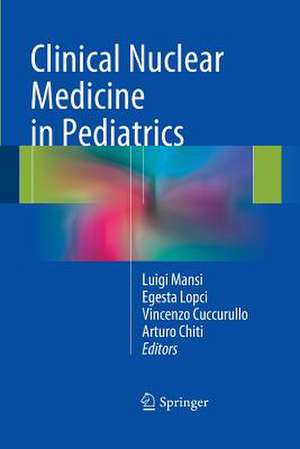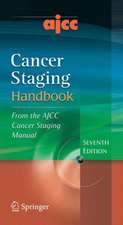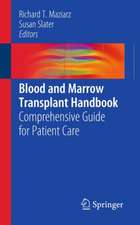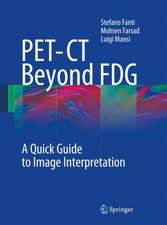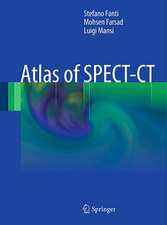Clinical Nuclear Medicine in Pediatrics
Editat de Luigi Mansi, Egesta Lopci, Vincenzo Cuccurullo, Arturo Chitien Limba Engleză Paperback – 23 aug 2016
| Toate formatele și edițiile | Preț | Express |
|---|---|---|
| Paperback (1) | 594.64 lei 6-8 săpt. | |
| Springer International Publishing – 23 aug 2016 | 594.64 lei 6-8 săpt. | |
| Hardback (1) | 746.43 lei 38-44 zile | |
| Springer International Publishing – 12 noi 2015 | 746.43 lei 38-44 zile |
Preț: 594.64 lei
Preț vechi: 625.94 lei
-5% Nou
Puncte Express: 892
Preț estimativ în valută:
113.79€ • 119.35$ • 94.72£
113.79€ • 119.35$ • 94.72£
Carte tipărită la comandă
Livrare economică 01-15 aprilie
Preluare comenzi: 021 569.72.76
Specificații
ISBN-13: 9783319371597
ISBN-10: 3319371592
Pagini: 380
Ilustrații: VIII, 380 p.
Dimensiuni: 155 x 235 mm
Greutate: 0.54 kg
Ediția:Softcover reprint of the original 1st ed. 2016
Editura: Springer International Publishing
Colecția Springer
Locul publicării:Cham, Switzerland
ISBN-10: 3319371592
Pagini: 380
Ilustrații: VIII, 380 p.
Dimensiuni: 155 x 235 mm
Greutate: 0.54 kg
Ediția:Softcover reprint of the original 1st ed. 2016
Editura: Springer International Publishing
Colecția Springer
Locul publicării:Cham, Switzerland
Cuprins
The global effort towards harmonization of pediatrics imaging.- Peculiar aspects and problems of Diagnostic Nuclear Medicine in Pediatrics.- PET/MRI in children.- Current issues in molecular radiotherapy in children.- Radiation risk from medical exposure in children.- Emergency/urgency.- CNS (non-oncologic).- Lung.- Endocrinology.- Cardiology.- Musculoskeletal.- Gastrointestinal.- Nephro-Urinary system.- Oncology.- Children Care in 2020: issues and perspectives.
Recenzii
“The target audience includes nuclear medicine physicians, radiologists, technologists, or others involved in pediatric nuclear imaging. … this book ultimately fulfills its goal of providing the necessary information about the appropriate use of nuclear medicine in the care of children. The book is concise, current, and well organized. I would recommend it to pediatric nuclear medicine subspecialists around the world.” (Daniel Peter Thut, Doody’s Book Reviews, March, 2016)
“All chapters are comprehensive and well structured, covering clinical and technical (radiopharmaceuticals, instrumentation) aspects, interpretation and pitfalls; a table of contents precedes each of them, thus facilitating quick search for particular information. The book is pleasant to read with numerous illustrations that are well chosen and of excellent quality. This makes it an outstanding tool for teaching students, technologists and nuclear medicine residents. … this book should be at hand for staff members, above all physicians, technologists and nurses.” (Angelika Bischof Delaloye, European Journal of Nuclear Medicine and Molecular Imaging, Vol. 43, 2016)
“All chapters are comprehensive and well structured, covering clinical and technical (radiopharmaceuticals, instrumentation) aspects, interpretation and pitfalls; a table of contents precedes each of them, thus facilitating quick search for particular information. The book is pleasant to read with numerous illustrations that are well chosen and of excellent quality. This makes it an outstanding tool for teaching students, technologists and nuclear medicine residents. … this book should be at hand for staff members, above all physicians, technologists and nurses.” (Angelika Bischof Delaloye, European Journal of Nuclear Medicine and Molecular Imaging, Vol. 43, 2016)
Textul de pe ultima copertă
This book provides a comprehensive state-of-the-art review of pediatric nuclear medicine, encompassing both diagnostic and therapeutic applications. Detailed attention is paid to the role of FDG PET-CT within oncology, but a variety of other long-established or less frequently used diagnostic procedures are also covered. Each indication is critically discussed from a clinical perspective, with analysis of benefits and limitations and comparison against the information yield of alternative techniques. The coverage of therapy based on radiopharmaceuticals includes the most relevant current strategies, including those utilizing radioiodine, MIBG, or radiolabelled peptides. In addition, issues concerning the radiation risk of nuclear medicine procedures in children are addressed. All chapters have been written by international experts and include the most up-to-date scientific and clinical information.
Caracteristici
Reviews the role of pediatric nuclear medicine techniques in diagnosis and therapy Explains how to use nuclear medicine techniques to acquire an early diagnosis, define prognosis and select and monitor therapeutic strategy Pays detailed attention to the role of hybrid imaging modalities
